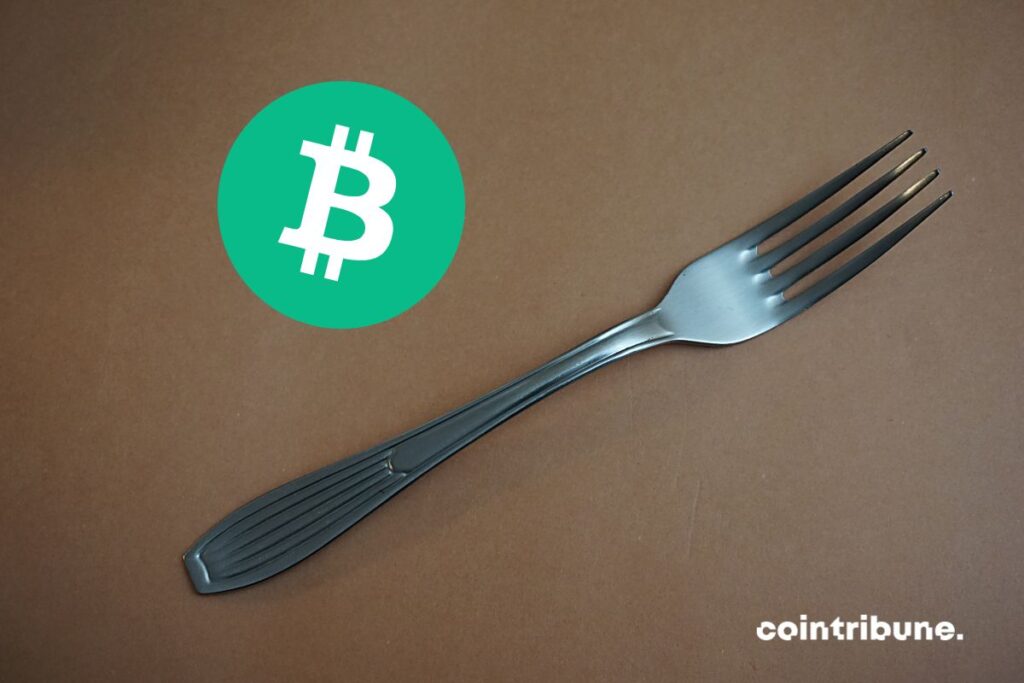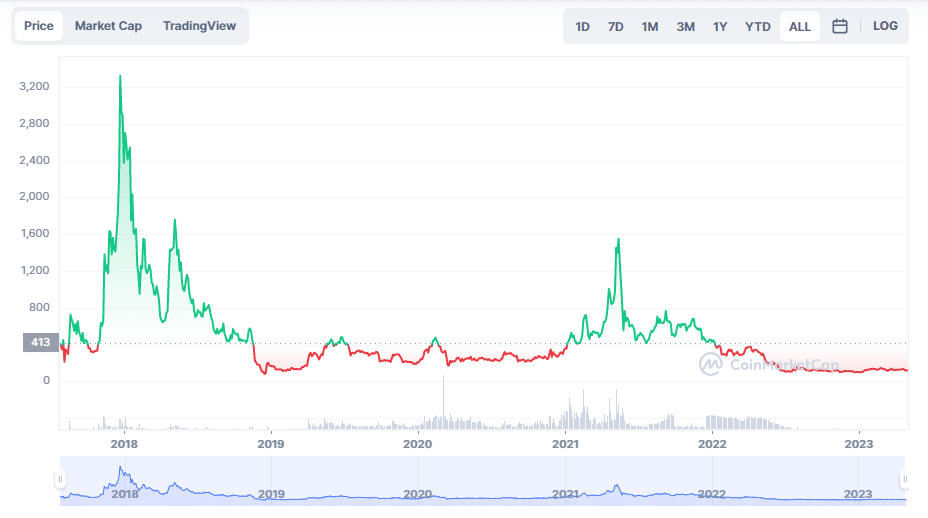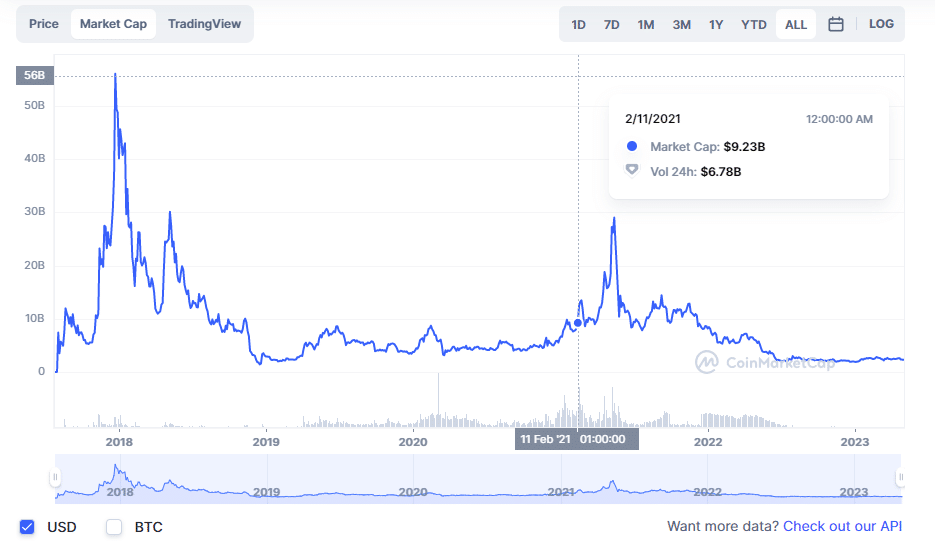Bitcoin Cash (BCH): What Is It?
Since its creation in 2009, Bitcoin (BTC) has faced challenges related to scalability and transaction fees. To address these issues, several hard forks have emerged, including Bitcoin Cash (BCH). This digital currency was born with the aim of improving the scalability and efficiency of transactions. Let’s take a deep dive into the history of BCH, its benefits and drawbacks, as well as its potential uses and development prospects.

History and Origin of Bitcoin Cash
The Context of the Creation of Bitcoin Cash
Bitcoin Cash was created to address two major challenges of the Bitcoin network: network congestion and scalability.
Network Congestion of Bitcoin
Over time, BTC became increasingly popular, leading to a surge in transaction volumes on its network. This increase resulted in network congestion, slowing down transactions and raising transaction fees.
Scalability
The debate on scalability began in 2015 when the block size limit for bitcoins, set at 1 MB, became a barrier for the network’s ability to process a large number of transactions. Some members of the Bitcoin community proposed increasing the block size to enhance transaction speed.
Others, however, suggested solutions such as adopting SegWit (Segregated Witness). This mechanism allows for transaction data compression to free up space in existing blocks.
These debates led to a stalemate, with opposing camps unable to agree on the best solution to improve scalability.
The Birth of Bitcoin Cash
The 2017 Hard Fork
In August 2017, a group of Bitcoin developers and miners proposed a new version of Bitcoin, called Bitcoin Cash. The main difference between Bitcoin Cash and Bitcoin is the block size, which increased from 1 MB to 8 MB, and then to 32 MB, allowing the network to process a greater number of transactions per block.
However, this proposal led to a hard fork of Bitcoin, where the original blockchain was split into two. Bitcoin holders automatically received the same amount of Bitcoin Cash as they had in bitcoins at the time of the split. Since then, the two currencies have become independent and have continued to operate separately.
Key Players in the Project
Roger Ver, also known as “Bitcoin Jesus“, is one of the main advocates for Bitcoin Cash. He believes that Bitcoin Cash is more useful as a means of payment than Bitcoin due to its increased transaction capacity and lower transaction fees.
Jihan Wu, co-founder of Bitmain, one of the largest manufacturers of BTC mining hardware, is also a supporter of Bitcoin Cash. Bitmain operates BCH token mines and has invested in protocol development projects.
BCH is also supported by Amaury Sechet, a prominent figure in the crypto ecosystem, who greatly contributed to its creation and development. Sechet eventually left the project to become the head of Bitcoin ABC.

Advantages and Disadvantages of Bitcoin Cash
The Bitcoin Cash protocol presents a number of advantages and disadvantages compared to Bitcoin.
Advantages of Bitcoin Cash
Increased Transaction Capacity
The main difference between BCH and BTC is the block size, which allows for increased transaction capacity on the Bitcoin Cash network. With 32 MB blocks, Bitcoin Cash can process more transactions than Bitcoin, which is limited to 1 MB. This means that users can send and receive payments more quickly.
Reduced Transaction Fees
Thanks to the increased transaction capacity of Bitcoin Cash, transaction fees are also lower than those of Bitcoin. Therefore, users can conduct transactions at a lower cost, making it a more attractive option for small transactions.
Quick Confirmation of Transactions
Since Bitcoin Cash blocks are larger than those of Bitcoin, transactions are confirmed more quickly, typically in less than 10 minutes. This makes Bitcoin Cash better suited for real-time online payments, such as online purchases and international fund transfers.
Disadvantages of Bitcoin Cash
Less Recognition than Bitcoin
BTC is the most well-known and widely used cryptocurrency in the world, with a market capitalization much greater than that of BCH. As a result, Bitcoin Cash is less known, has limited adoption, and does not enjoy the same support from the cryptocurrency community. This contributes to making it less attractive from the perspective of some investors.
Centralization Risk
Some critics of Bitcoin Cash argue that the larger block size can lead to centralization of the blockchain, as only miners with sufficient resources can mine 32 MB blocks. This could potentially make the blockchain more vulnerable to manipulation and censorship.
Limited Adoption Compared to Bitcoin
Bitcoin Cash still lags far behind BTC in terms of adoption and user numbers. Although there are a number of merchants and platforms that accept Bitcoin Cash, it is still less widely accepted than Satoshi Nakamoto’s cryptocurrency.
How to Use Bitcoin Cash?
To use Bitcoin Cash, you need to have a wallet compatible with this cryptocurrency. There are two types of wallets: hard wallets (or hardware wallets) and soft wallets (or software wallets).
Hard Wallets
Hardware wallets are physical devices that store your private keys offline. They provide additional security for your funds. Popular hard wallets that support BCH include Ledger Nano S and Trezor.
Cold Wallets
Software wallets are applications that you can download onto your computer or smartphone to store and manage your digital assets. Some popular soft wallets for Bitcoin Cash include Electron Cash, Bitcoin.com Wallet, Paytaca, Zapit, Coinomi, and Exodus.
How to Buy and Sell Bitcoin Cash?
To trade BCH, there are two main methods available to you.
Cryptocurrency Exchanges
Exchanges allow you to buy and sell BCH tokens in exchange for other cryptocurrencies or fiat currencies such as the US dollar (USD) or the euro (EUR). Popular platforms that support Bitcoin Cash include Binance, Crypto.com, Bithumb, Bitstamp, LocalCryptos, Huobi, OKX, Deepcoin, CoinEX, BTCBox, Kraken, and Coinbase.
The buying/selling process on these platforms generally involves creating an account, verifying your identity, and adding funds to your account. Subsequently, you have the option to place buy or sell orders by positioning yourself on Bitcoin Cash.
Brokerage Services
Brokers allow you to buy and sell Bitcoin Cash in exchange for fiat currencies. In 2023, the top brokerage services supporting BCH include eToro, AvaTrade, XTB, Trade Republic, and IG Markets.
Brokerage services have the characteristic of setting their own prices when trading assets, unlike exchanges that allow you to negotiate at the price you wish. Additionally, they typically charge fees that are generally higher than those of cryptocurrency exchange platforms.
Use of Bitcoin Cash for Payments
Merchants can accept payments in BCH for the purchase of goods and services. To do this, they just need to integrate payment platforms compatible with this cryptocurrency.
Merchants Accepting Bitcoin Cash
If you wish to use BCH for making payments, Overstock and Newegg are two examples of merchants that accept this token. You can find a more extensive list on directories such as AcceptBitcoin.Cash and Bitcoin Cash Map.
That said, some merchants offer discounts on payments made in Bitcoin Cash. Because this type of transaction eliminates any fees related to using a credit card. Also, unlike credit cards, automatic cancellations, refunds, chargebacks, and other unexpected fees no longer exist. A positive point for merchants.
Payment Platforms
There are platforms that facilitate payments in Bitcoin Cash. Among them, BitPay and Purse. These platforms have the advantage of automatically converting your cryptocurrencies into fiat currencies. This optimizes the transaction for both merchants and customers.

Future and Perspectives of Bitcoin Cash
Future Technological Developments
The developers of Bitcoin Cash continue to work to improve the security, performance, and scalability of the network. Ongoing projects also include adding new features to enhance the utility of the token.
Furthermore, Bitcoin Cash may face forks in the future. This has happened in the past with famous hard forks such as:
- the Bitcoin SV (BSV): created in November 2018 to restore a vision closer to that of Satoshi Nakamoto with larger blocks;
- the Bitcoin Diamond (BCD): launched in November 2017 to increase block size and enhance transaction speed.
Protocol Updates
Between 2017 and 2022, the Bitcoin Cash protocol saw numerous updates. These aimed to improve the security and robustness of the network, as well as to reduce transaction fees.
The next upgrade, scheduled for May 15, 2023, will offer features such as CashTokens for identity tokens, voting with fungible tokens, multi-threaded conventions, NFTs, and multi-convention decentralized applications.
Expansion Projects
The Bitcoin Cash team is also working on expansion projects to improve the adoption and use of its cryptocurrency. This includes signing strategic partnerships with merchants and payment platforms like BitPay.
That said, developing such an ecosystem also requires encouraging innovation through groundbreaking projects and improving its services to grow its user base.
Adoption and Market Growth
The adoption of Bitcoin Cash continues to grow slowly, with a market capitalization that struggles to increase over time.
Favorable Factors for Adoption
Factors that could facilitate the democratization of the protocol include increasing transaction capacity, reducing transaction fees, and shortening block confirmation times.
Challenges and Obstacles
Among the challenges facing Bitcoin Cash, we have:
- competition from Bitcoin and other cryptocurrencies such as Bitcoin Gold and Litecoin (LTC);
- the risk of centralization;
- regulation.
The risk of centralization is a major challenge for the platform, as larger block sizes can lead to blockchain centralization. As for regulation, it poses a potential obstacle, as governments may decide to regulate or even ban the use of this currency.
Conclusion
Bitcoin Cash is a cryptocurrency created to solve the problem of Bitcoin network congestion and to improve network scalability. With increased transaction capacity, reduced transaction fees, and rapid transaction confirmation, Bitcoin Cash is a more convenient option for real-time online payments. However, it still lags far behind Bitcoin in terms of adoption and user numbers and faces challenges such as the risk of centralization and government regulation.
Maximize your Cointribune experience with our "Read to Earn" program! For every article you read, earn points and access exclusive rewards. Sign up now and start earning benefits.
Je suis venue à la blockchain par curiosité et j'y suis restée par passion. J'ai été émerveillée par les possibilités qu'elle offre à travers ses divers cas d'utilisation. Avec ma plume, j'espère contribuer à démocratiser cette technologie et à montrer comment elle peut aider à rendre le monde meilleur.
The views, thoughts, and opinions expressed in this article belong solely to the author, and should not be taken as investment advice. Do your own research before taking any investment decisions.